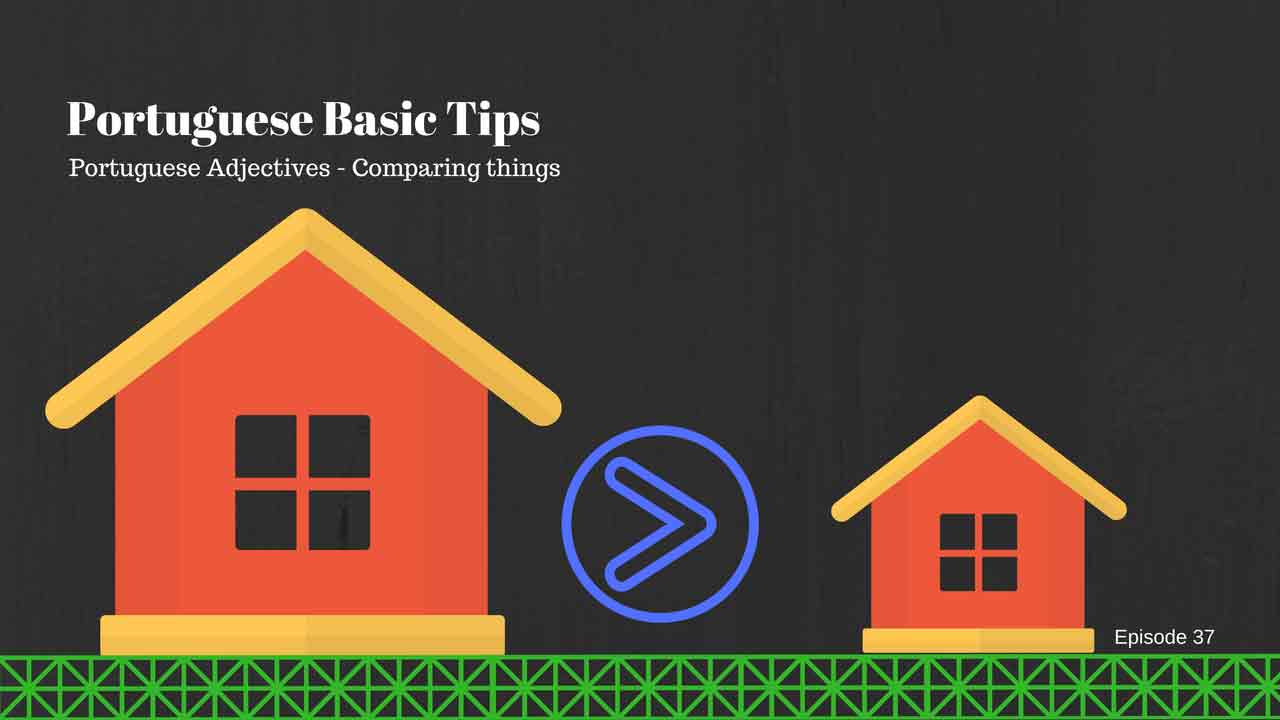Portuguese Adjectives – Comparing things using adjectives

Portuguese adjectives – How to compare things in Portuguese
Hello and welcome to our Portuguese Basic Tips called Portuguese adjectives
On today’s episode we are going to speak about Portuguese adjectives. I will give you a few tips about how to compare things in Portuguese by using adjectives.
Visit our podcast about family members in Portuguese, in order to increase your vocabulary
Adjectives are words we use to qualify the noun; we use them to modify it, right? So, you can say in Portuguese “Esta é uma casa” (This is a house). The word “casa” is a noun in this case. But you can also say “Esta é uma bela casa” (This is a beautiful house). Note that in this second example, I’m talking about a quality of that house.
What if I want to compare those qualities in Portuguese? How can I do that?
For example, how can I say in Portuguese “This house is prettier than the other one”?
Well, in this case you should say “Esta casa é mais bonita do que a outra”.
Its purpose is to compare two or more things or two or more people.
In Portuguese we have a few rules to do that. Let’s take some examples:
Comparativo de igualdade (Comparative of equality)
- This house is as beautiful as the other one.
- Esta casa é tão bonita quanto a outra.
Note that in English, in this case we use “as… as”; In Portuguese we use “tão … quanto”
Comparativo de Inferioridade (Comparative of Inferiority)
- This house is less beautiful than the other one.
- Esta casa é menos bonita do que a outra.
Note that in this case, instead of using “less …than”, we use “menos … do que” or “menos …que”.
Comparativo de Superioridade (Comparative of superiority)
- This house is prettier than the other one.
Well, as you already know, in this case you should say
- Esta casa é mais bonita do que a outra.
Note that in Portuguese we use “mais …do que”, instead of using “prettier” in this case.
Pretty simple, isn’t it? Ok, but I need to be straight with you. We also have a few cases that we can’t apply those rules. If you want to use the adjectives “bom” (good), “mau” (bad), “grande” (big) and “pequeno” (small) – you’ll necessarily have to change these ways to “melhor” (better), “pior” (worse), “maior” (bigger) and menor (smaller).
For instance:
- This house is better than the other one
- Esta casa é melhor do que a outra
- This house is worse than the other one
- Esta casa é pior do que a outra
- This house is bigger than the other one
- Esta casa é maior do que a outra
- This house is smaller than the other one
- Esta casa é menor do que a outra
Note that in those cases you can’t use, for instance “Esta casa é mais grande do que a outra” or “Esta casa é mais boa do que a outra”. Unless you were comparing the same object, it would be wrong!
Become a Premium Member to download our full transcripts
Listen to our last episode about days of the week and months of the year in Portuguese
Read this article (only in Portuguese) about adjectives
That’s enough for today.
I hope you like it!
Marcos Sales
Podcast (portuguesebasictips): Play in new window | Download







Recent Comments